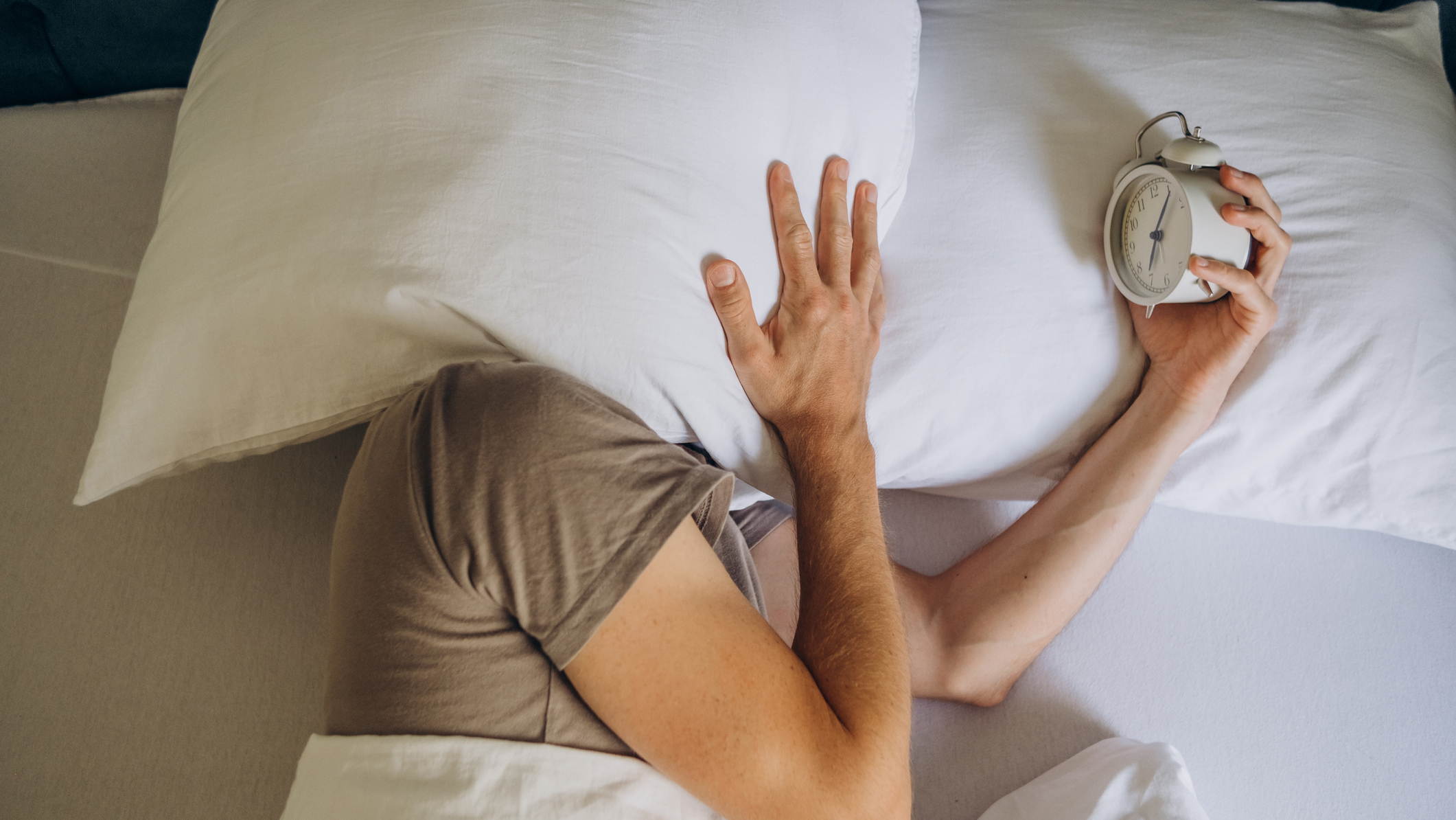Blog
How to fix your circadian rhythm in 7 simple steps

If you struggle to fall asleep or wake up feeling groggy, an out-of-sync circadian rhythm could be to blame.
This internal 24-hour clock controls your sleep-wake cycle, helping your body know when it’s time to wake up and wind down.
Influenced largely by light exposure, your circadian rhythm plays a key role in regulating not just sleep, but also mood, energy levels, and your metabolism.
So, how do you fix your circadian rhythm? Habits, such as overexposure to blue light, irregular sleep schedules or long-haul travel can disrupt its rhythm, leading to poor night’s sleep and daytime fatigue.
We’re talking to the experts about how your body clock works, what causes it to become dysregulated, and how to fix your circadian rhythm to wake up feeling ready for the day.
What is circadian rhythm?
Otherwise known as the body’s 24-hour clock, circadian rhythm responds to light and dark, as well as other stressors, to help regulate sleep and control various factors, including hormone production and mood.
“It regulates things like when you feel sleepy, when you wake up, and even when you’re most alert or hungry,” explains Dr. Raj Dasgupta, a board-certified physician specializing in sleep medicine.
“It’s mostly influenced by light, especially sunlight, which signals to your brain when it’s time to be awake or wind down,” he adds.
“When this rhythm is working the way it should, everything from your sleep to your energy and mood tends to stay on track.”
Disruptions to your circadian rhythm, such as jet lag, shift work or too much screen time at night, can affect sleep quality, energy levels, and your overall health.
Signs of a dysregulated circadian rhythm
Have you just had one too many late nights, or is your circadian rhythm dysregulated?
We’ll often describe it as being tired but wired
Sleep expert Kerry Davies says that when it’s out of sync, it can “feel like your body and brain are running on different time zones.”
Common signs to look out for include “difficulty falling asleep, waking during the night or too early in the morning, feeling groggy during the day, and wide awake when it’s time to wind down,” she explains.
Davies adds that we’ll often describe it as being tired but wired. “It can also impact mood, energy, digestion, and focus – the rhythm of the body does affect every system.”

How to fix your circadian rhythm
1. Get more sunlight
A study highlighted the importance of maximizing daylight exposure, revealing that morning light helps shift your internal clock forward, while too much light in the evening can push it back.
“Light is the most powerful signal for your body clock. Exposure to natural light sends a clear message to your brain that it’s time to be alert,” explains Davies.
“This helps regulate melatonin (your sleep hormone) and supports more predictable sleep-wake timing,” she explains.
“Morning sunlight essentially sets the timer for when your body will begin to feel sleepy later that night.”

2. Slowly adjust your bedtime
If your sleep schedule is off, shifting your bedtime slowly can help get you back on track, explains Dr. Dasgupta.
“Instead of jumping straight to your ideal bedtime, try moving it by 15 to 20 minutes every few nights to give your body time to adjust without feeling like you’re forcing it,” he adds.
This clever way of shifting it gradually means you won’t be lying there wide awake for hours, and it’s especially helpful if you’re “dealing with jet lag, recovering from a stretch of bad sleep, or trying to reset after staying up too late.”
Once you have your bedtime set, try and be consistent with it, as your body’s internal clock, like a real alarm clock, will start to programme these times in.

3. Improve your sleep hygiene
Poor sleep hygiene can be the answer to many sleep problems – so what exactly is sleep hygiene?
It covers everything from making sure you’re sleeping on the best mattress for your sleep needs to what you ate for dinner. Generally, it includes your habits and environment that impact your sleep.
If there is too much noise or light in your bedroom, you may wake up constantly in the night, disrupting your circadian rhythm — this could then put your body into fight or flight mode.
Of course, some disruptions, such as children or partners, are unavoidable, but if you need to, invest in blackout blinds, earplugs or comfortable bedding to make sure your sleep is uninterrupted.

4. Reduce alcohol and caffeine intake
After midday, switch to decaf coffee or tea – why? “Caffeine stays in your system for hours and can make it hard to fall asleep, even if you don’t feel ‘wired’,” explains Dr. Dasgupta.
“Alcohol might help you doze off, but it actually disrupts the quality of your sleep, leading to more wake-ups and less deep, restful sleep,” he says.
“Cutting back, especially in the afternoon and evening, helps your body stay in rhythm and sleep better overall.”

5. Get regular exercise
If you’ve not been sleeping well, exercise may feel like the last thing you want to do, but movement can help to regulate your sleep-wake cycle, according to this study.
“Regular movement helps keep your circadian rhythm running smoothly,” explains Dr. Dasgupta.
“Exercise during the day, especially in the morning or early afternoon, tells your body it’s time to be active, which can lead to feeling sleepier when bedtime rolls around, while it also helps reduce stress, which is often a barrier to good sleep.”
However, he goes on to warn that exercising too close to bedtime, especially intense exercise which puts a big strain on the body, can actually make it harder to wind down.

6. Avoid blue light
Whether you’re scrolling on Instagram or messaging friends late at night, blue light, which is emitted from our phones, can play havoc with our melatonin levels.
Studies show that blue light can suppress melatonin; this is the hormone which helps us fall asleep at night.
Although it’s unlikely to greatly impact your body clock, it’s worth trying a screen-free hour before bed. This will also help prevent your brain from being too stimulated to switch off.

7. Eat at regular times
‘Never go to bed on a full stomach’ – may be a saying which has been around for years, but there is some truth to it, especially when it comes to our sleep.
“Our digestive system runs on its own clock. Eating at irregular times, especially late at night, can confuse the body’s signals and delay the natural onset of melatonin,” says Davies.
“Regular mealtimes help anchor your circadian rhythm by reinforcing consistent cues for wakefulness and rest,” she explains.
“I always recommend avoiding large meals too close to bedtime, around 3 hours, to give the body space to focus on repair, not digestion.”
If in doubt, follow the 10-3-2-1-0 rule.

What impacts circadian function?
Our modern lifestyles are full of rhythm-disrupting habits, says Davies.
“Exposure to artificial light late into the evening, irregular sleep and meal times, stress, shift work, and screen time all blur the natural cues the body relies on,” she explains.
Forming new habits before bedtime is a great way to regulate your circadian function, helping you fall asleep quickly and get a good night’s rest.
“Essentially, your circadian rhythm thrives on consistency and contrast (clear signals that it’s daytime or nighttime). When those signals are missing or mixed up, the rhythm starts to unravel.”












